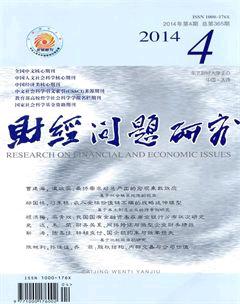最終需求對總產出的宏觀乘數效應
曹建海 溫政實
摘 要: 遵循里昂惕夫的投入產出模型,本文基于社會核算矩陣的研究框架,通過擴展的收入產出循環體系清晰地闡釋了產業增加值、收入分配和最終需求的內在關系。在此基礎上對中國2010年的社會核算矩陣進行了奇異值分解。結果表明,經濟內部的相互作用隱含了一組宏觀乘數,每一宏觀乘數都對應著一系列遵循相同路徑的產業組合,這些產業組合及其變化情況可以被識別和量化。這一方法的現實意義在于從需求層面探討了經濟政策的制定及其目標評估的可能性。
關鍵詞: 最終需求;宏觀乘數;社會核算矩陣
中圖分類號: F56 文獻標識碼: A 文章編號: 1000176X(2014)04000308
最早的需求乘數分析可以追溯到Rasmussen的研究。Rasmussen[1]指出,整個產業系統產出增長必須與最終需求對j產業產品需要量的增長相匹配,i產業產出的增長也必須符合最終需求對所有產業產品需要量的增長。近些年來,越來越多的國外學者采用不同的方法對這一問題進行了不同程度的研究。Do Amaral等[2]采用“歐幾里德距離乘數”對西班牙、葡萄牙、巴利阿里群島和亞速爾群島的數據研究發現,最終需求的結構變化比規模變化對產業部門產出的沖擊更為顯著。沈利生[3]利用投入產出模型研究了最終需求結構和三次產業結構的關系,他認為三次產業結構的優化必須依賴于需求結構的調整;劉瑞翔和安同良[4]基于最終需求的視角,通過非競爭性投入產出模型分析了中國經濟增長的動力來源后發現,最終需求是經濟增長的主要動力,但動力來源結構卻不斷變化。
然而,現有文獻對產業部門產出和最終需求的具體作用機制未能做出更為深入的解釋,相應的實證分析更是缺乏。實際上,最終需求決定了總產出和產業增加值的形成,后者通過增值構成要素產生國內收入,國內收入又通過居民、企業和政府等機構部門形成收入分配,收入分配又會影響最終需求并使得這一過程得以閉合循環。本文采用奇異值分解的方法對機構部門的特征和產業互動的增值現象做出了較為深入的解剖和透視,隨后定義并定量確定了一組宏觀乘數。這些乘數能夠反映經濟內部的相互作用和宏觀經濟變量結構以及后者對前者的潛在影響程度。在其他條件不變的情況下,如果將最終需求的變動視為政策調控的結果,那么新的產出變動即為政策調控所能達到的政策目標。
一、投入產出的基本架構
最初的投入產出問題是在產業間結構不變和固定價格的假設下,研究與最終需求相關的產業部門的均衡產出。產業間相互作用結構不變是指固定系數假設,Rose 和 Casler[5]指出,這意味著規模報酬不變和投入比例不變,后者反映了投入的非互補性,即對某一產業的投入替代不會引起相應的產出增加。產出向量x由產業部門預先給定的最終需求向量f誘導。均衡產出向量可表示為:
該調控政策及其政策目標如圖2所示。由政策調控引起的機構部門對產業部門的需求增加擴張了相應產業的總產出;機構部門最終需求的下降也使得除了產業3之外的其他產業產出出現下降,這表明消費品制造業(產業3)具有需求剛性。值得一提的是,雖然機構部門最終需求的下降使得總產出相應減少,但是部分產業產出減少的幅度小于需求下降的程度,如產業4(裝備制造及重化工業)和產業7(交通運輸郵政及倉儲業)。
結合圖1我們發現,機構部門對諸如制造業(尤其是裝備制造及重化工業)的微小需求增加能夠引起該產業產出的大幅增加,而最終需求的減少卻未能引起該產業產出的相應減少。這在一定程度上解釋了中國長期以來產能過剩難以消除的原因。
五、結 論
通過以上分析,本文展示了最終需求變動對產出變動的宏觀乘數效應。在其他條件不變的情況下,如果將最終需求的變動視為政策調控的結果,那么新的產出變動即為政策調控所能達到的政策目標。逆向考察的分析結果顯示,我們能夠找到一組政策調控措施,通過產業部門和機構部門的內在作用來提高服務業在三次產業中的比重。這些政策充分展示了內生決定的多部門政策調控和多部門政策目標的特征,也就是政策調控對多部門目標變量的影響效應。鑒于政策調控對政策目標的總體影響可以根據宏觀變量構成的波動進行量化,這為宏觀經濟的政策設計和結果評估提供了可行的方法。 參考文獻:
[1]
Rasmussen, P N Studies in Inter-Sectoral Relations[M] Amsterdam: North-Holland Publishing Company, 1956134-136
[2] Do Amaral, J F ,Dias,J,Lopes,JC A New Kind of Production and Value-Added Multiplier for Assessing the Scale and Structure Effects of Demand Shocks in Input–Output Frameworks[J] The Annals of Regional Science, 2012,49(1):103-115
[3] 沈利生 最終需求結構變動怎樣影響產業結構變動[J] 數量經濟技術經濟研究, 2011,(12):82-95
[4] 劉瑞翔,安同良 中國經濟增長的動力來源與轉換展望[J] 經濟研究, 2011,(7):30-41
[5] Rose, A, Casler, S Input–Output Structural Decomposition Analysis: A Critical Appraisal[J] Economic Systems Research, 1996,8(1):33-62
[6] Miller, R E, Blair, P D Input-Output Analysis: Foundations and Extensions[M] New York: Cambridge University Press, 2009243-257endprint
[7] Ciaschini, M, Socci, C Final Demand Impact On Output: A Macro Multiplier Approach[J] Journal of Policy Modeling, 2007,29(1):115-132
[8] Miyazawa, K Input-Output Analysis and the Structure of Income Distribution[M] New York: Springer-Verlag Berlin Heidelberg, 19761-129
[9] Pyatt, G Some Early Multiplier Models of the Relationship between Income Distribution and Production Structure[J] Economic Systems Research, 2001,13(2):139-163
[10] Oosterhaven, J, Polenske, K R 21 Modern Regional Input–Output and Impact Analyses[D] Handbook of Regional Growth and Development Theories, 2009423-439
[11] Golub, G H, Reinsch, C Singular Value Decomposition and Least Squares Solutions[J] Numerische Mathematik, 1970,14(5):403-420
The Macro Multiplier Effects of Final Demand to Total Output:
Based on Social Accounting Matrix Perspective
CAO Jian-hai1,WEN Zheng-shi2
(1Institute of Industrial Economics of CASS,Beijing 100836,China;
2Graduate School of CASS, Beijing 102488,China)
Abstract: Following Leontief Input-Output model and based on Social Accounting Matrix, we illustrate the interrelationships among industrial value added, income distribution and final demand by an extended income-output cycle system Then, the spectral decomposition techniques of physic was applied to Chinas economic data analysis, which indicates the interactions in the economy create sets of clusters of industries that follow the same path and can be identified and quantified through macro multipliers Macro multiplier decomposition has important practical significance, since the method explores the possibility of formulating economic policies as well as evaluating the policy objectives
Key words: final demand;macro multiplier;social accounting matrix;policy control
(責任編輯:劉 艷)endprint
[7] Ciaschini, M, Socci, C Final Demand Impact On Output: A Macro Multiplier Approach[J] Journal of Policy Modeling, 2007,29(1):115-132
[8] Miyazawa, K Input-Output Analysis and the Structure of Income Distribution[M] New York: Springer-Verlag Berlin Heidelberg, 19761-129
[9] Pyatt, G Some Early Multiplier Models of the Relationship between Income Distribution and Production Structure[J] Economic Systems Research, 2001,13(2):139-163
[10] Oosterhaven, J, Polenske, K R 21 Modern Regional Input–Output and Impact Analyses[D] Handbook of Regional Growth and Development Theories, 2009423-439
[11] Golub, G H, Reinsch, C Singular Value Decomposition and Least Squares Solutions[J] Numerische Mathematik, 1970,14(5):403-420
The Macro Multiplier Effects of Final Demand to Total Output:
Based on Social Accounting Matrix Perspective
CAO Jian-hai1,WEN Zheng-shi2
(1Institute of Industrial Economics of CASS,Beijing 100836,China;
2Graduate School of CASS, Beijing 102488,China)
Abstract: Following Leontief Input-Output model and based on Social Accounting Matrix, we illustrate the interrelationships among industrial value added, income distribution and final demand by an extended income-output cycle system Then, the spectral decomposition techniques of physic was applied to Chinas economic data analysis, which indicates the interactions in the economy create sets of clusters of industries that follow the same path and can be identified and quantified through macro multipliers Macro multiplier decomposition has important practical significance, since the method explores the possibility of formulating economic policies as well as evaluating the policy objectives
Key words: final demand;macro multiplier;social accounting matrix;policy control
(責任編輯:劉 艷)endprint
[7] Ciaschini, M, Socci, C Final Demand Impact On Output: A Macro Multiplier Approach[J] Journal of Policy Modeling, 2007,29(1):115-132
[8] Miyazawa, K Input-Output Analysis and the Structure of Income Distribution[M] New York: Springer-Verlag Berlin Heidelberg, 19761-129
[9] Pyatt, G Some Early Multiplier Models of the Relationship between Income Distribution and Production Structure[J] Economic Systems Research, 2001,13(2):139-163
[10] Oosterhaven, J, Polenske, K R 21 Modern Regional Input–Output and Impact Analyses[D] Handbook of Regional Growth and Development Theories, 2009423-439
[11] Golub, G H, Reinsch, C Singular Value Decomposition and Least Squares Solutions[J] Numerische Mathematik, 1970,14(5):403-420
The Macro Multiplier Effects of Final Demand to Total Output:
Based on Social Accounting Matrix Perspective
CAO Jian-hai1,WEN Zheng-shi2
(1Institute of Industrial Economics of CASS,Beijing 100836,China;
2Graduate School of CASS, Beijing 102488,China)
Abstract: Following Leontief Input-Output model and based on Social Accounting Matrix, we illustrate the interrelationships among industrial value added, income distribution and final demand by an extended income-output cycle system Then, the spectral decomposition techniques of physic was applied to Chinas economic data analysis, which indicates the interactions in the economy create sets of clusters of industries that follow the same path and can be identified and quantified through macro multipliers Macro multiplier decomposition has important practical significance, since the method explores the possibility of formulating economic policies as well as evaluating the policy objectives
Key words: final demand;macro multiplier;social accounting matrix;policy control
(責任編輯:劉 艷)endprint

